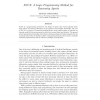7504 search results - page 166 / 1501 » Computing with Action Potentials |
137
click to vote
LPNMR
1999
Springer
15 years 6 months ago
1999
Springer
This paper continues the line of research on representing actions, on the automation of commonsense reasoning and on planning that deals with causal theories and with action langua...
113
click to vote
CORR
2004
Springer
15 years 2 months ago
2004
Springer
FLUX is a programming method for the design of agents that reason logically about their actions and sensor information in the presence of incomplete knowledge. The core of FLUX is...
90
Voted
ECCV
2010
Springer
15 years 6 months ago
2010
Springer
Abstract. The aim of this paper is to learn driving behaviour by associating the actions recorded from a human driver with pre-attentive visual input, implemented using holistic im...
134
Voted
FSTTCS
1998
Springer
15 years 6 months ago
1998
Springer
Molecular Computation (MC) is massively parallel computation where data is stored and processed within objects of molecular size. Biomolecular Computation (BMC) is MC using biotec...
110
click to vote
ICML
2003
IEEE
16 years 3 months ago
2003
IEEE
An important issue in reinforcement learning is how to incorporate expert knowledge in a principled manner, especially as we scale up to real-world tasks. In this paper, we presen...

